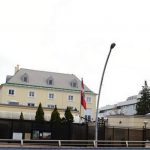”Since 2013, Turkey has turned into a disaster scene” – Sevan Nişanyan
This is the second part of our interview with Turkish-Armenian author Sevan Nişanyan who escaped a Turkish prison in 2017 and has been living in exile in Greece since.
How do you react to discussions about the republic and reintroducing the oath of loyalty to the republic in elementary schools?
The republic has always been discussed, the same problems, the same issues, the same topics. It was the same thing in the 1960s, 1970s and 1980s. I haven’t heard anything new this year. It is the same things all over. It is a frustrating debate. As for the weekly student pledges, it is idolising a totalitarian regime. They’re trying to replace one type of idolatry with another, it is ridiculous.
The discussion on this issue aims to disguise another debate. I think the regime has two poles and two owners. There are the supporters of the old order, the Kemalists and then there are the populists disguised as Islamists. These two have appeared to be at peace with each other since the July 2016 coup attempt, but as far as I can understand, now they’re showing some teeth towards each other. What can I say? Best of luck to both.
Why do you think they are showing hostility towards each other right now?
There’s a power struggle. Maybe President Erdoğan is feeling weak due to an impending economic crisis. Therefore, they are checking each other out.
They’re making calculations to see if they can hit each other at their weakest. That’s what I see.
Why would President Erdoğan feel weak?
Any other government in a democracy would have a hard time staying in power after events like the Gezi Park protests or the corruption allegations of December 2013. Erdoğan’s government looked like it was about to crumble, but he recovered. He may have compromised and agreed to do certain things to stay in power. The most apparent proof of such a reconciliation is the abandonment of the Kurdish peace talks. Another was the release of the arrested secularists accused of plotting against the Turkish government.
A third proof is the green lighting of a massive purge, perhaps demanded by the Turkish military.
These were the moves that Erdoğan had to move away from his former political positions. In this sense, it was a defeat for Erdoğan. But Erdoğan is a powerful politician; he indeed is an exceptional political leader who, at least for now, was able to turn this defeat into political victory. It is intriguing.
But Erdoğan is ruling Turkey with executive orders and many journalists, lawmakers, academicians are in prison. He even defies the Constitutional Court, does he not?
No doubt the situation in Turkey right now is deplorable. It looks very authoritarian. There is no rule of law, freedom of speech, free press. It is heartbreaking. When I said exceptional, I meant as a strategist, as an ideologist. Otherwise, I am aware of the damage he is doing to the country. I don’t approve of Erdoğan’s policies. Recognising his abilities is one thing, supporting them is another. Until 2013, I thought Erdoğan was on a more right track than the others. Since 2013, Turkey has turned into a disaster scene. We’re in a terrible situation. I meant, I recognise that he is skilled, because he’s a smart, brilliant politician.
Atatürk period was a single party era. Do you think we have a single party system now? How do you compare the two presidencies?
They’re very similar. Both regarding structure and personality the two periods are very similar. The paths they chose and the evolution of their governances are almost identical as well. Three major Turkish leaders in the last 120 years; Sultan Abdülhamit, Mustafa Kemal and Recep Tayyip Erdoğan have many similarities regarding the quality of the regime.
There are quiet periods in Turkish history where an illusion of democracy, freedom, pluralism starts blooming. Then a strong leader appears and puts a halt to it. That usually is the only option of that leader. In all three cases, we see this very clearly. It looks like that is the only way this country can be governed. As a matter of fact, none of these leaders exhibits any trace of a political belief or ideological coherence. All three are purely pragmatic politicians. They did what their power enabled them to do. Their rhetoric is very similar as well.
In the early years of President Erdoğan’s rule there was hope for Turkey joining the European Union. Why do you think Turkey is still struggling to join the EU?
For a period of time Turkey there was the hope of joining the European Union. It was an impossible hope. But that hope brought a lot of positive things to Turkey. But quickly, from 2006 onwards, both parties realised that it was just a dream. Turkey will not join the EU, and the EU cannot afford Turkey joining the union. Politically it is impossible. If there were a referendum on it, not even 5 percent of the EU population would vote to accept Turkey into the union. Hence Turkey was forced to give up on its dream.
Currently Turkey, I believe, is looking for a new foreign policy strategy. Maybe the government already has a foreign policy strategy, I don’t know. But honestly, I don’t think that Turkey’s foreign policy is that bad. Under these conditions, I think the government is performing just fine.
Today Turkish foreign policy is moving towards Eurasia. And some criticise Turkey’s Syria policy. What is your take on that?
Let me ask you: Let’s say you’re running the country. Turkey’s traditional foreign policy partners have been in Europe and America. Europe is failing. Europe has almost no say on world affairs. Its economy is in serious trouble. Conflicts among themselves are at a hazardous level at this point. Britain is leaving the union. What America is trying to do in the Middle East is unclear. They’re doing a lot of weird things; they are apparently losing their control over Iraq and Syria and the Middle East in general. What would you do if you were the president if Turkey in this case? When you look Turkey’s foreign policy from this point of view, despite some mistakes, not everything the government is doing is wrong. It would be unfair to say that. After all, if you can have a summit in Istanbul with the presidents of France, Germany and Russia, and not invite the United States, you are doing something right.
I would like to ask you about the detained journalists and activists. Osman Kavala, a political activist, has been jailed for more than a year now. What is your stance on this?
Many intellectuals have been detained in recent years. They have been jailed, persecuted and silenced. The journalist Ahmet Altan is a very respectable person. He truly is a dignified, intelligent, rational and righteous person. I want to emphasise righteous.
Another person jail is Osman Kavala. Osman Kavala has been a close friend of mine for years. He is an extremely valuable person, righteous as well. Both of these people were imprisoned on false accusations. A country where these people are in prison cannot be considered a civilised country. This proves that there is no rule of law in this country. I don’t know who wants these people in prison, but it may not be the first name you think of.
Are you saying that it might not be Erdoğan?
I’m just saying what we see might not be the whole picture. We argued for years that we have a form of dictatorship in Turkey. We noted that there are some people who are ideological, and corrupt. We argued that Turkey should take the scalpel and cut out the tumour. And we hoped that the government would do that. Hence, we supported Tayyip Erdoğan. Unfortunately, time has proven us wrong. Tayyip Erdoğan’s efforts in turned out to be inadequate. And the former groups returned to power, and they are more powerfully than before. That’s what is happening.
You supported the 2010 Constitutional change. Now, when you look back, would you still support it?
Without a doubt. We didn’t know the results would be like this. Nobody could have known. Turkey needed that constitutional change. Because it was the constitution of a corrupt regime. Thousands of people were jailed and executed under that constitution. These people robbed public banks.
A government promises to change course, of course you support it. It was unclear if they had the power and will to change course. After all, they couldn’t or didn’t, or they never intended to. I don’t know. But yes, I believe supporting the government was the right thing to do in 2010, and I stand by my decision.
I’d like to get your view on the local elections. You have criticised the HDP’s performance during the presidential elections. How can a party whose co-chairs are in prison compete in elections?
First of all, I didn’t criticise the HDP. That’s not true. I expected that they would get more votes, yes. But it is apparent that this was not a fair election. We are talking about a party with many of its deputies, co-chairs and members are behind bars. We’re talking about cities that have been destroyed and bombed. Of course, they couldn’t perform. Criticism is the wrong word there. I didn’t criticise them. I just said I’m sorry that they didn’t perform better … I think our only choice is to hope that this will pass as well.”
Do you think the pro-minority HDP or other civil society organisations could be a precursor for a new movement in Turkey?
I do not think that the conditions in Turkey right now are conducive for a serious democratic movement to flourish. I believe we’ll have to wait for a while.
Source: Ahval News



